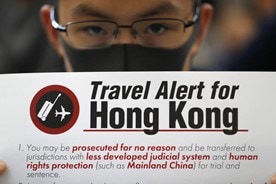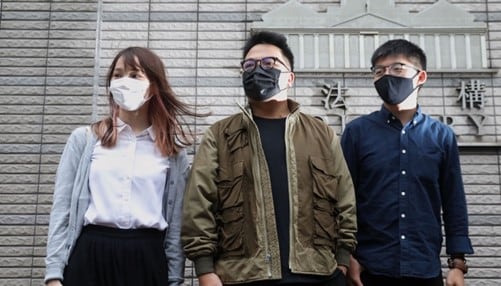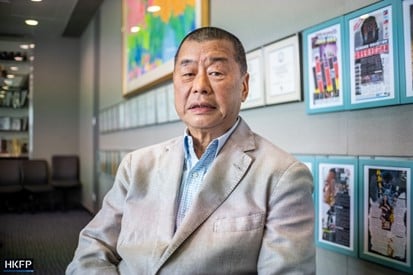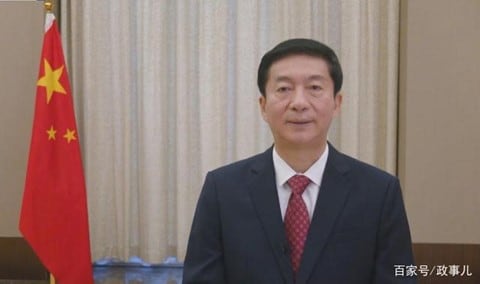Introduction
In recent weeks, Hong Kong authorities have conducted sweeping arrests of high-profile activists for alleged breaches of the country's new National Security Law. In the latest blow to the city's pro-democracy movement, veteran activists Joshua Wong, Agnes Chow, and Ivan Lam were sentenced to extended prison time, while media mogul Jimmy Lai was formally charged with "colluding with foreign forces."[1] As Beijing cracks down on political dissent and media freedom in the city, Hong Kong's hopes for any semblance of autonomy under the "One Country, Two Systems" framework are disappearing at an alarming rate.

Jimmy Lai, founder of Apple Daily, walks to a prison van after being charged under the National Security Law in Hong Kong, on December 12, 2020. (Source: Rfa.org)
The Hong Kong National Security Law
Following the waves of protests triggered by a proposed extradition law,[2] China introduced the "Hong Kong National Security Law" on June 30, 2020. The legislation grants law enforcement sweeping powers to curb the four offences of "secession, subversion, terrorist activities and collusion with foreign countries or elements."[3] Critics fear that these broadly defined offenses and trumped-up charges of "unlawful assembly"[4] can be appropriated by authorities and may be used to stifle political dissent. More than 10,000 people have been arrested since June 2019 for alleged crimes relating to pro-democracy protests, [5] including Joshua Wong, Agnes Chow, Ivan Lam, and Jimmy Lai.

(Source: Facebook.com)
Joshua Wong
Wong, 24, rose to prominence as a student leader in the 2014 "Umbrella Revolution" protests for universal suffrage. Since then, he has become one of the de facto leaders and a face of the Hong Kong pro-democracy movement. Wong was barred from running in the Hong Kong District Council elections due to his support for Hong Kong's independence from the People's Republic of China. While Wong has been arrested on numerous occasions between 2019-2020, most charges are for minor infractions such as breaching a mask mandate – rather than contraventions of the National Security Law.[6] However, after pleading guilty to organizing and participating in the June 21, 2019 demonstration outside Hong Kong police headquarters, Wong was sentenced on December 2 to 13 1/2 months in prison.[7]

Joshua Wong (Source: Hongkongfp.com)

(Source: Twitter.com/joshuawongcf)
Agnes Chow
Chow, 23, co-founded pro-democracy political organization 'Demosisto' with Joshua Wong in 2016.[8] She then ran as a candidate in a 2018 by-election, but was disqualified by the Electoral Affairs Commission because of to her party's support for Hong Kong "self-determination."[9] Hours after the National Security Law came into effect, Demosisto self-disbanded in order to avoid implicating its members in newly illegal activities.[10] Chow was formally charged under the National Security Law in August for "colluding with foreign forces,"[11] and on December 2 she was sentenced to 10 months in prison for inciting and participating in the June 2019 demonstration outside Hong Kong police headquarters.

Agnes Chow (Source: Hongkongfp.com)

In August 2020, Agnes Chow was arrested for a suspected violation of the national security law for the Hong Kong Special Administrative Region (HKSAR). The tweet is by Nathan Law, a pro-democracy activist from Hong Kong and former chairman of Demosisto who currently resides in London. (Source: Twitter.com/nathanlawkc, August 10, 2020)
Ivan Lam
Along with Wong and Chow, Ivan Lam was a leading member of Demosisto until its disbandment earlier this year. Lam has been an active organizer in the pro-democracy movement. In 2011 Lam co-founded 'Scholarism' with Wong, a student activist group that agitated against Beijing’s influence on Hong Kong’s education and youth policies. Scholarism was especially active during the 2014 'Umbrella Revolution’ protests in Hong Kong. Lam previously served thirteen months in jail for storming the Hong Kong Legislative Council in 2014.[12] After several years of activism, Lam replaced Wong as the chair of Demosisto in 2018.[13] On December 2, Lam was sentenced to seven months in jail after pleading guilty to incitement.[14]

Ivan Lam (Source: Scmp.com)

Agnes Chow, Ivan Lam, Joshua Wong (Source: Scmp.com)
Jimmy Lai
Pro-democracy supporter and media tycoon Jimmy Lai, 73, was arrested on December 2. Shortly after the National Security Law came into effect, Lai was arrested alongside his sons and two senior executives of his company, Next Digital Media Group. As the founder of pro-democracy newspaper The Apple Daily, Lai has been vocal in supporting the protesters and critical of Beijing's policies. On the same day as his arrest in August, the Apple Daily offices were raided by 200 police officers.[15] He has been arrested several times in the past several years, and in recent months, for various protest-related offences. The Chinese government has labeled him a "traitor"[16] and a member of the new "Gang of Four"[17] accused of inciting chaos in Hong Kong and colluding with foreign forces. While Lai has previously been charged under the National Security Law, his most recent arrest was actually over alleged fraud rather than an infraction of the security legislation.[18]
Lai was charged under the National Security Law for calling on "overseas institutions, organizations and personnel to impose sanctions or take other hostile actions against Hong Kong or China."[19] As alleged evidence of his collusion with foreign forces, the prosecutors have cited interviews Lai gave to foreign media as well as his usage of Twitter.[20] However, some evidence tabled by prosecutors predates the enactment of the National Security Law, such as Lai's meeting with U.S. Secretary of State Mike Pompeo on July 8, 2019.[21] If admissible in court, this would likely contradict Article 39 of the legislation,[22] and Hong Kong Chief Executive Carrie Lam has expressed assurances that the National Security Law will not be applied retroactively.[23]

Hong Kong pro-democracy mogul Jimmy Lai (Source: Hong Kong Free Press)

Twitter.com/nathanlawkc, December 12, 2020
Disenfranchising Hong Kongers
The latest spate of arrests confirms fears that the National Security Law will be appropriated to suppress media freedom and political dissent in Hong Kong. Even before the legislation came into effect in June this year, the National Security Law had been the subject of controversy for three main reasons.
Firstly, the law was developed in secret by the elite body within China's legislature, the Standing Committee of the National People's Congress,[24] bypassing the Hong Kong Legislative Council. Hong Kongers legislators were therefore disenfranchised in the formulation of this law. The actual text of the law was only revealed to the public after it had already been passed.
Secondly, the four types of national security crimes enumerated in the legislation are highly ambiguous, leading to fears that the law may be appropriated in order to prosecute against any activity that is seen as contrary to Beijing's interests. Carrying a maximum penalty of life imprisonment,[xxv] the lack of specificity leaves open the possibility of varying interpretations in the reading and application of this law.

The Standing Committee of the National People's Congress (Source: english.sina.com)
Thirdly, this legislation has had a chilling effect on Hong Kongers' ability to exercise their freedom of speech and engage in political activism. In addition to the recent high-profile arrests, hundreds of protesters have also been arrested under this law in recent months. Pro-democracy political organizations such as Demisoto elected to self-disband out of fear of contravening it.[25] While the punitive effects of this law may be quantified in the number of arrests, the unquantifiable deterrent effect on Hong Kongers who dare to express dissent will have a more pernicious and lasting effect on the survival of the pro-democracy movement.

Logo of disbanded pro-democracy organization 'Demosisto' (Source: Demosisto.hk)
SUPPORT OUR WORK

Beijing's Long-Term Aspirations for Hong Kong's Political Ecosystem
While the National Security Law was largely seen to provide a reactionary measure for Beijing to crack down on dissent, it also serves Beijing's long-term aspirations to consolidating its rule over Hong Kong. In a recent speech delivered by Luo Huining (Director of the Liaison Office of the Central People's Government in the Hong Kong SAR) on National Constitution Day, Luo repeatedly advocated for "effectively safeguarding national security and implementing patriots to govern Hong Kong"[26] (see Appendix). In conflating "national security" with filling the Hong Kong government with "patriotic" individuals loyal to Beijing, Luo revealed the CCP's existential concern over a restive and seditious Hong Kong. The National Security Law therefore represents an important mechanism for Beijing to influence Hong Kong's political ecosystem well in advance of the city's re-integration with Mainland China in 2047.

Director of the Liaison Office of the Central People's Government in the Hong Kong SAR Luo Huining (Source: baijiahao.baidu.com)
Conclusion
Through the arrest of these high-profile democracy activists, Beijing is sending a clear message that political dissent and unsympathetic media will not be tolerated. As the National Security Law claims more casualties, the deterrent effect of this legislation risks paralysing the island's pro-democracy movement. Should Beijing continue to impose draconian measures to pacify the citizenry and consolidate its CCP's leadership, Hong Kong's autonomy under the 'One Country, Two Systems' model will become void of meaning.
*Heath Sloane is MEMRI's Chinese Media Studies Project research fellow.
Appendix – Full Speech Delivered By Director Of The Liaison Office Of The Central People's Government In The Hong Kong SAR Luo Huining – December 4, 2020[28]
Luo Huining: Only Under The Governance Of Patriots Can Hong Kong Have Long-Term Stability And Development
"Dear friends:
"Good morning! First of all, I would like to express my gratitude to the government of the Special Administrative Region and the Li Jin Education Centre for their efforts in organizing this 'National Constitution Day' under the epidemic situation!
"The novel coronavirus pneumonia epidemic in our country has gained worldwide attention. It has fully proved that our national system and governance system built on the basis of the Constitution can withstand the tests of strong winds and waves, and has formidable vitality and superiority.
"The close cooperation between Hong Kong and the Mainland in fighting the epidemic has also fully demonstrated the significant institutional advantages of the 'One Country, Two Systems' policy. Holding the 'National Constitution Day' activities at this time make us deeply aware once again of the great significance of the Constitution for governance of the nation and the governance of the Special Administrative Region, and the importance of studying, abiding by, and safeguarding the Constitution. I would like to take this opportunity to share three thoughts with you:
"Firstly, the Constitution and the Basic Law together constitute the constitutional basis of the Special Administrative Region, and Hong Kong society must fully recognize and respect the Constitution. Since its return to China, Hong Kong has been re-incorporated into the national governance system. The Constitution and the Basic Law have jointly established the new constitutional order of the Hong Kong Special Administrative Region.
"The Constitution is the fundamental law of the country, the legislative basis of the Basic Law, and the fundamental constitutional basis for the establishment of the Special Administrative Region. Only when the provisions of the Basic Law are understood within the framework of the Constitution can they be fully and accurately implemented.
"Over the past twenty-three years since Reunification, the Constitution and the Basic Law have been effectively implemented on the whole, and the practice of 'One Country, Two Systems' has achieved great success. But needless to say, from a series of major political and legal disputes, it can be seen that some people in Hong Kong only know to respect their original legal system without basic changes, and disregard fundamental changes in the Special Administrative Region's constitutional foundation. This is the intellectual root of some of the chaos in Hong Kong in recent years.
"The whole society must deeply realize that only by recognizing and respecting the Constitution and the Basic Law as the constitutional foundation of the Special Administrative Region, can it solve the new situations, new problems and challenges encountered in the practice of 'One Country, Two Systems' in recent years; Only under the joint protection of the Constitution and the Basic Law can Hong Kong's high degree of autonomy be put into practice, the spirit of the rule of law in Hong Kong survive, and the prosperity and stability of Hong Kong can be maintained for a long time.
"Secondly, the Constitution bears the important function of safeguarding national security, and the Hong Kong Special Administrative Region must earnestly safeguard national security. The cornerstone of a country's survival and prosperity is its national security.
"The Constitution, as the fundamental law of the country and the general constitution for governing and maintaining the country, of course places national security in an extremely important position, and must carry the important function of maintaining national security.
"National security is the supreme interest protected by the Constitution, and it is also the basis and prerequisite for the implementation of other constitutional systems. The fundamental purpose of the 'One Country, Two Systems' policy is to safeguard national sovereignty, security, and development interests and maintain Hong Kong's long-term prosperity and stability.
"Without national security, there would be no 'One Country, Two Systems', and there would be no prosperity and stability in Hong Kong. Since the "Amendment Disturbances" (protests over a proposed extradition bill) that occurred last year, Hong Kong fell into social turmoil. Residents' lives and property were seriously endangered, and national security faced great danger.
"The practice of 'One Country, Two Systems ' faced unprecedented severe challenges. The Central Government reviewed the situation, formulated the Hong Kong National Security Law in accordance with the Constitution and the Basic Law, and specified and institutionalized Hong Kong's constitutional requirements for safeguarding national security, filling Hong Kong's long-standing legal loopholes.
"In the past few months, the power of Hong Kong's national security law has begun to show, and Hong Kong has entered a critical period of transition from chaos to governance. In order to further strengthen the 'dyke' of safeguarding national security in the Hong Kong Special Administrative Region, many provisions of the Hong Kong National Security Law need to be transformed into a complete system and mechanism and become a code of conduct consciously abided by the general public, and effectively implemented by the administrative law enforcement and judicial organs of Hong Kong.
"Third, patriotism is a sacred obligation of Chinese citizens under the Constitution, and the Hong Kong Special Administrative Region must always insist that patriots govern Hong Kong. The reason why the Constitution stipulates that citizens have the obligation to safeguard the security, honour and interests of the motherland is because the Constitution, as the most effective legal carrier, embodies the boundless love of all the Chinese people for the motherland. Patriotism is the core of our great national spirit shown in the Constitution. Hong Kong has always shared the same future as the motherland.
"Only by loving the motherland can we truly love Hong Kong. Only under the governance of patriots can Hong Kong have long-term stability and development. However, in recent years, some of Hong Kong's election candidates and those elected to public office in the Special Administrative Region have publicly promoted the idea of 'Hong Kong Independence', refused to recognize the state's ownership and exercise of sovereignty over Hong Kong, and sought foreign countries or foreign forces to interfere in Hong Kong affairs, which is totally contrary to the constitutional requirement of "Patriots Governing Hong Kong".
"Last month, the Standing Committee of the National People's Congress passed a decision on the qualifications of members of the Legislative Council of the Hong Kong Special Administrative Region, which further clarified the bottom-line standards and political rules for "Patriots Governing Hong Kong" and ensured that all politicians uphold the Basic Law of the Constitution, are loyal to the country and to the SAR, and expelled from the governance structure of the Special Administrative Region those who have caused trouble to the country and Hong Kong.
"This decision sets long-term rules for the qualification of Legislative Council members and also builds a deep level of identity and sentiments of public officials of the Special Administrative Region towards the country, which is conducive to the implementation of the patriotic spirit established in the Constitution and demonstrates the supremacy of the Constitution in the Hong Kong Special Administrative Region.
Friends, the establishment of constitutional authority depends on cultivating constitutional awareness and the concept of the constitution in the whole society.
"The government and public servants of the Special Administrative Region should take the lead in conducting in-depth constitutional propaganda and education, vigorously promote the spirit of the constitution, conscientiously enhance awareness of the constitution, and promote the full implementation of the Constitution in the Special Administrative Region.
"The vast number of young people is the hope of Hong Kong's future. They should closely combine the modern and contemporary history of China, especially Hong Kong's history of the Century of Humiliation, and have a deep understanding of the process of the formation and development of the Constitution;
"Closely combined with the great achievements and challenges in the practice of the 'One Country, Two Systems', we should deeply understand that the Constitution is the fundamental guarantee of Hong Kong's future destiny and its own future development. As long as the whole society earnestly respects and effectively implements the Basic Law of the Constitutional, the cause of 'One Country, Two Systems' will be able to cut through the waves and achieve stability.
"Thank you all!"
[1] Rfa.org/english/news/china/charged-12112020103426.html, December 11, 2020.
[2] Scmp.com/news/hong-kong/politics/article/3087926/hong-kong-protests-one-year-national-security-law-looming, June 8, 2020.
[3] Chinadaily.com.cn/a/202007/01/WS5efbd6f5a310834817256495.html, July 1, 2020.
[4] Elegislation.gov.hk/hk/cap245?pmc=1&m=1&pm=0.
[5] Hongkongwatch.org/protest-prosecution, November 20, 2020.
[6] News.rthk.hk/rthk/en/component/k2/1551408-20200924.htm, September 24, 2020.
[7] Reuters.com/article/us-hongkong-security/hong-kong-activist-joshua-wong-jailed-for-13-1-2-months-for-2019-anti-government-protest-idUSKBN28C0SP, December 2, 2020.
[8] Hongkongfp.com/2020/06/30/breaking-hong-kong-activists-joshua-wong-nathan-law-and-agnes-chow-withdraw-from-pro-democracy-demosisto-group-as-security-law-passes, June 30, 2020.
[9] scmp.com/news/hong-kong/politics/article/2130714/hong-kong-activist-agnes-chow-banned-legco-election, January 27, 2018.
[10] Hongkongfp.com/2020/06/30/breaking-joshua-wongs-pro-democracy-group-demosisto-disbands-hours-after-hong-kong-security-law-passed, June 30, 2020.
[11] Globaltimes.cn/content/1197341.shtml, August 11, 2020.
[12] Scmp.com/news/hong-kong/politics/article/2149405/demosistos-new-chairman-ivan-lam-talks-about-joshua-wong, June 6, 2018.
[13] Scmp.com/news/hong-kong/politics/article/2161573/chinese-state-police-seized-members-hong-kong-political, August 27, 2018.
[14] Hongkongfp.com/2020/12/02/breaking-hong-kong-activists-joshua-wong-agnes-chow-ivan-lam-jailed-over-2019-unauthorised-assembly, December 2, 2020.
[15] Hk.appledaily.com/news/20200810/WWRDTYIUBIZEHN7SXZWLQUUPHU, August 10, 2020.
[16] Globaltimes.cn/content/1189312.shtml, May 24, 2020.
[17] Chinadaily.com.cn/a/201911/01/WS5dbb89faa310cf3e35574d6e.html, November 1, 2019.
[18] Voanews.com/east-asia-pacific/hong-kong-media-tycoon-jimmy-lai-charged-under-security-law, December 11, 2020.
[19] Globaltimes.cn/content/1209828.shtml, December 13, 2020.
[20] Hongkongfp.com/2020/12/14/security-law-hong-kong-justice-dept-appalled-by-foreign-officials-demanding-release-of-media-tycoon-jimmy-lai, December 14, 2020.
[21] State.gov/secretary-pompeos-meeting-with-hong-kong-businessman-and-publisher-jimmy-lai, July 8, 2019; Rfa.org/english/news/china/charged-12142020131823.html, December 14, 2020.
[22] Xinhuanet.com/english/2020-07/01/c_139178753.htm, July 1, 2020.
[23] News.rthk.hk/rthk/en/component/k2/1534945-20200630.htm, June 30, 2020.
[24] Fmprc.gov.cn/mfa_eng/xwfw_665399/s2510_665401/2535_665405/t1793446.shtml, June 30, 2020.
[25] Xinhuanet.com/english/2020-07/01/c_139178753.htm, July 1, 2020.
[26] Hongkongfp.com/2020/06/30/breaking-joshua-wongs-pro-democracy-group-demosisto-disbands-hours-after-hong-kong-security-law-passed, June 30, 2020.
[27] Chinanews.com/ga/2020/12-05/9355193.shtml, December 5, 2020.
[28] Locpg.gov.cn/jsdt/2020-12/04/c_1210916290.htm, December 4, 2020.




